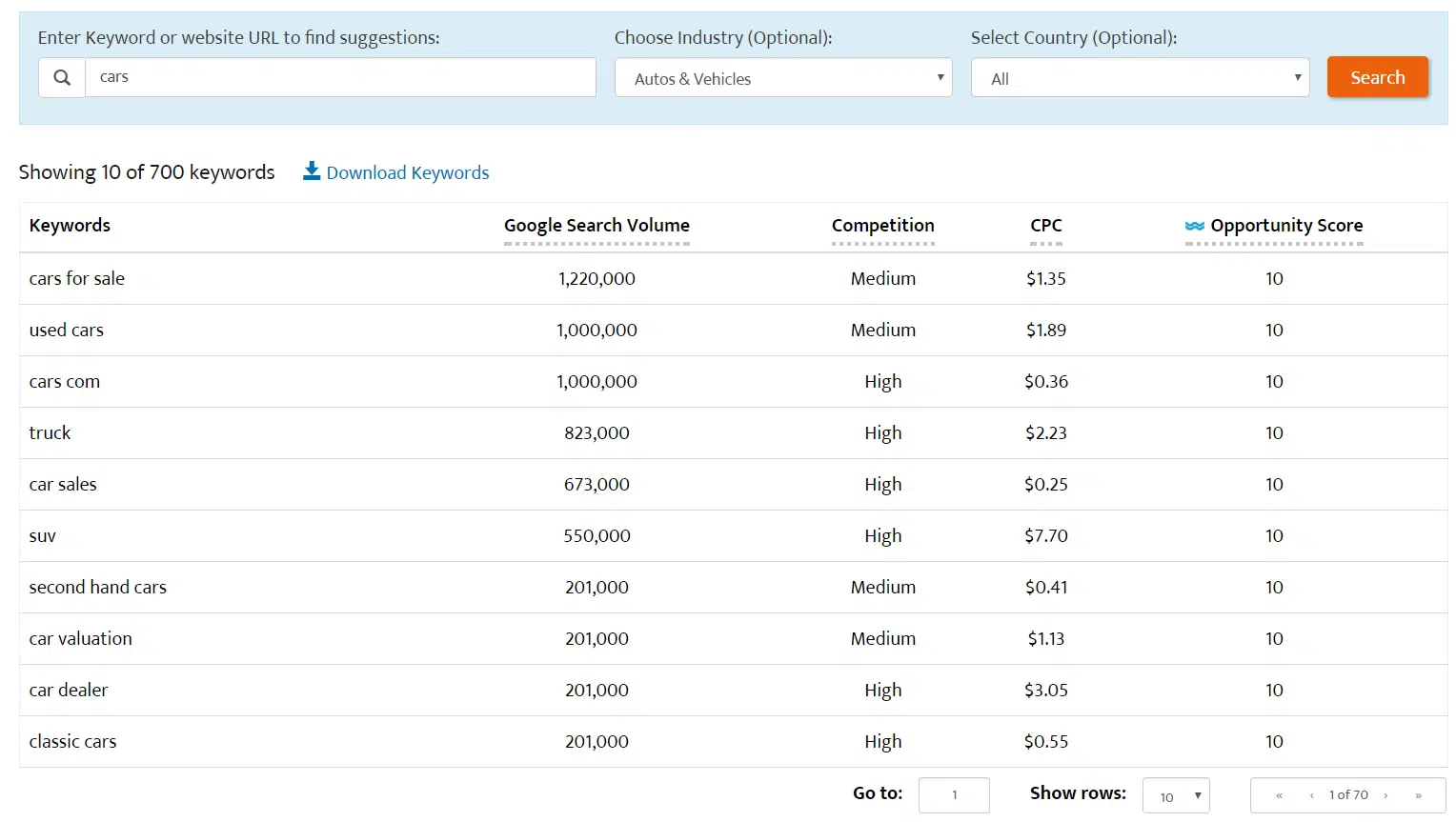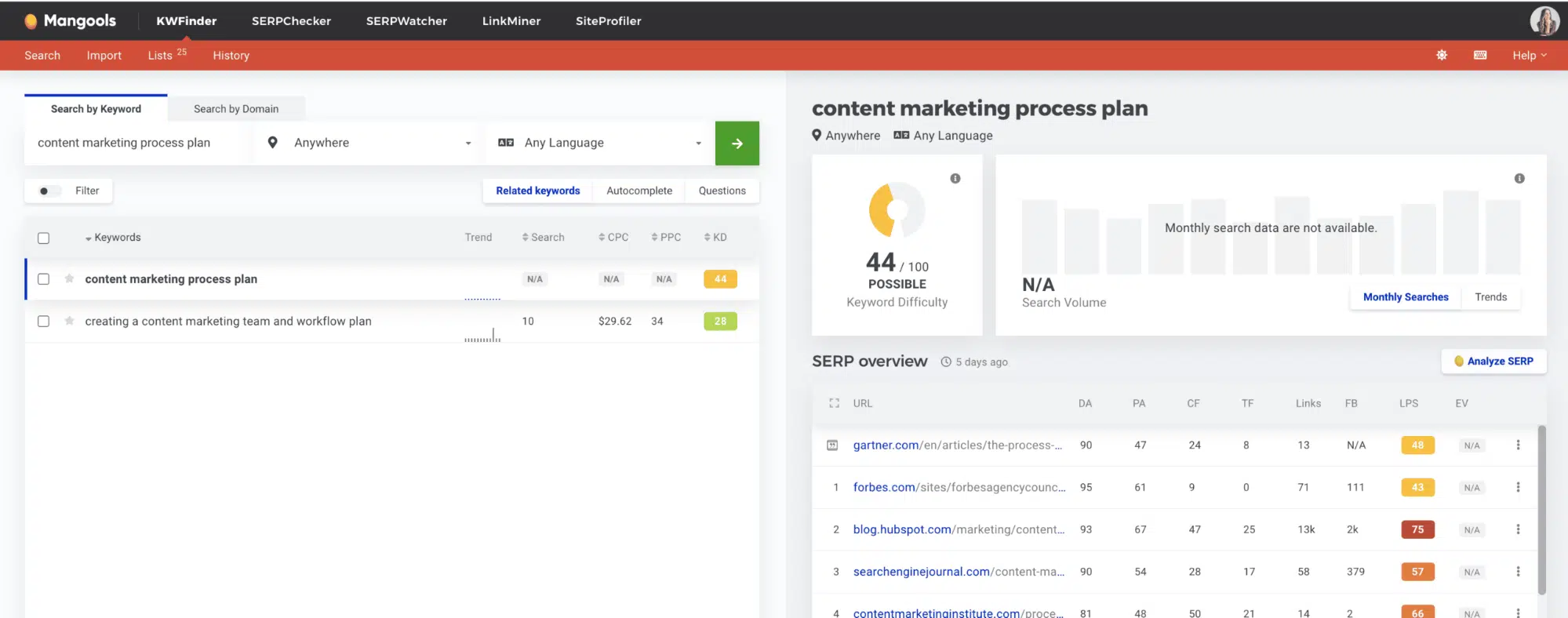Boost your SEO! Uncover how to find ideal niche keywords, decode search intent, and implement them in your strategy for increased visibility.
You’ve been told time and again that knowing how to find ideal niche keywords is a game-changer.
You nod, smile and pretend you understand.
The truth? It’s all Greek to you.
Your website looks like the digital equivalent of a ghost town – tumbleweeds included. Visitors are as rare as unicorns, and those who do stumble upon it leave faster than one can say “SEO.”
Isn’t there more to this keyword thing than meets the eye?
Absolutely!
Like finding Waldo in a sea of stripes, knowing how to find ideal niche keywords is about looking smarter, not harder.
What happens when you find niche keywords for your SEO strategy
Unleashing the power of niche keywords, particularly those long-tail variations, is a game-changer for any successful SEO strategy.
These highly specific terms are laser-focused on your narrow industry vertical and act as magnets to pull qualified traffic toward your website.
Niche keywords may not have high search volumes like broader key phrases do; however, the opportunity lies in their crystal clear intent. You’ll get more opportunities to get in front of buyers instead of broad phrase seekers who aren’t as specific.
This clarity makes them indispensable tools for accurately reaching out to your target audience.
Users who input these detailed queries into search engines are typically further down the conversion funnel and more likely primed for purchase.
Beyond this, you’ll find that niche keywords tend not to attract heavy competition compared with generic ones. They present an excellent opportunity, especially if you’re running a smaller business, to climb higher up the SERPs ladder without wresting bigger competitors off each rung.
While popular key terms with hefty search volume have their place within an overarching SEO strategy, integrating targeted niche keywords can yield substantial benefits, too.
How niche keyword research helps your business grow
Nailing down niche keyword research is crucial to your SEO strategy.
It’s about pinpointing those potential keywords that are super relevant, yet not always top of mind, that will connect you straight to a buyer.
And in a single blog post, you can target the entire buyer’s journey – that’s why creating a strategy to use content to rank for niche keywords can be such a win, bringing you even higher ROI than social media, which doesn’t necessarily bring you targeted traffic unless you’re dumping money into ads.
Understanding the importance of search intent
Digging into search intent plays a big part in unearthing targeted keywords. Figuring out what users are searching for when they type certain words into search engines is key.
If you can get inside this user intent, you can align your niche keyword choices with your audience’s wants and needs. This alignment boosts the chances that these individuals will stumble upon and interact with your content or products.
Finding niche keywords demands constant vigilance and tweaking because trends evolve. But don’t let this deter you – its benefits for driving organic traffic make it worth investing time and resources to sharpen this aspect of your SEO game plan.
Tools for conducting effective niche keyword research
In the realm of niche keyword research, having reliable tools at your disposal is crucial.
We’ll discuss what these tools are below.
Leveraging Google Trends for niche keyword research
Digging deeper into the niche SEO publisher’s toolbox, a good starter tool is Google Trends. It can help you discover popular key terms in your specific industry to create content for that vertical.


This platform helps you spot seasonal trends and allows comparison between different keywords over time.
Additionally, its regional interest feature gives insights into the geographical distribution of specific keyword phrases – valuable information when understanding where your target audience resides.
The right use and interpretation can effectively streamline SEO strategy while boosting organic traffic potential. Remember to constantly monitor and tweak to align with changing search intent or business objectives.
Refining your niche keyword list: A crucial step
The creation of a niche keyword list is just the beginning.
You must refine it to suit your SEO strategy to truly leverage its power.
Leveraging SEO opportunity scores for maximum ROI
WordStream’s Free Keyword Tool, with its Opportunity Score feature, provides an efficient way to evaluate each potential keyword within your existing PPC strategy context.


This tool considers aspects like search volume and competition level alongside cost per click (CPC), enabling you to identify which keywords could deliver the highest return on investment (ROI).
Evaluating search volume and SEO difficulty: Key metrics in the refinement process
Besides opportunity scores, analyzing search volume and assessing SEO difficulty are two critical factors when refining your niche keyword list.
These metrics provide insights into how many people are searching for that term (search volume) and gauge the competitiveness of ranking highly in SERPs (SEO difficulty).
Another powerful tool worth mentioning here is Mangools’ KWFinder, which offers detailed data about monthly searches, CPCs, and competition levels, making it easier than ever before for you to sort and find ideal keywords. This is one of my favorite tools to help me uncover keywords – I use it daily.
Look for a keyword phrase that will score under 45 if you want a serious opportunity.


Implementing niche keywords into your content strategy
Navigating the implementation of niche keywords in your content can feel like a tightrope walk.
It’s crucial to embed these specific terms, but not at the expense of readability or value.
When editing AI content, you can use a framework I call CRAFT, which stands for:
- Cut the fluff
- Review, edit and optimize
- Add visuals, images and media
- Fact check
- Trust-build with a personal story, tone and links
This framework helps ensure you’re creating readable, high-value content for your readers.
Monitoring and adapting your keyword strategy
Your keyword strategy isn’t static; it needs to evolve with search trends or business objectives changes.
Regularly scrutinize your SEO results using tools such as Moz Pro, which provides comprehensive tracking and analytics for SEO.
This continuous monitoring ensures that you’re effectively targeting relevant keywords. Adjust without hesitation if some targeted keywords aren’t yielding the expected results.
Incorporating niche keywords and implementing niche keyword research tools into your strategy naturally might seem daunting initially, but it gets easier over time. Always remember: providing valuable content for your target audience trumps other SEO strategies.
Start ranking higher with targeted niche keywords today
The road to superior search engine rankings begins by pinpointing high-value niche keywords.
One tool that can help you here is Semrush, a keyword research platform offering vital data such as monthly searches, cost per click (CPC), and competition level.
This information empowers businesses to craft effective SEO strategies. The metric of monthly searches reveals the popularity of specific terms, while CPC provides insight into advertisers’ willingness to invest for each ad click-through.
Facing off against your competitors becomes less daunting when you understand the competitive landscape through insights on competition levels for various keywords.
By harnessing these metrics effectively, choosing targeted niche keywords that align with your business goals and have a realistic chance at boosting visibility within search results is possible.
Know how to find ideal niche keywords and win
Great content isn’t a guessing game.
It starts with knowing how to find ideal niche keywords, going after the right keyword ideas, thinking about highly specific keywords and targeting long-tail keywords.
100 ideal visitors are far better than 10,000 broad searches (for example: “how to groom a Labradoodle” might have way less search volume – but it’s much better than “grooming,” if you sell Labradoodle grooming tools that can be the final CTA in that blog post; you’ll net real buyers).
Ultimately, it’s all about reaching a targeted audience and driving qualified traffic to your site. Knowing how to do niche keyword research is an essential tool for any business. It uncovers potential opportunities, including less obvious terms that can lead to valuable connections with customers.
The right tools make this process easier.
Refining your list of niche keywords requires careful consideration of search volume, intent and SEO difficulty. Long-tail variations are the key to optimizing organic traffic potential.
Incorporating these selected words into your content without compromising readability or value? That’s where real skill comes in.
Opinions expressed in this article are those of the guest author and not necessarily Search Engine Land. Staff authors are listed here.
Related stories
New on Search Engine Land
@media screen and (min-width: 800px) {
#div-gpt-ad-3191538-7 {
display: flex !important;
justify-content: center !important;
align-items: center !important;
min-width:770px;
min-height:260px;
}
}
@media screen and (min-width: 1279px) {
#div-gpt-ad-3191538-7 {
display: flex !important;
justify-content: center !important;
align-items: center !important;
min-width:800px!important;
min-height:440px!important;
}
}
googletag.cmd.push(function() { googletag.display(‘div-gpt-ad-3191538-7’); });
–>
Original Source: How to find ideal niche keywords